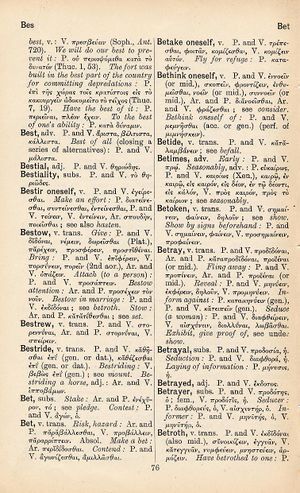betroth
κινδυνεύει μὲν γὰρ ἡμῶν οὐδέτερος οὐδὲν καλὸν κἀγαθὸν εἰδέναι, ἀλλ᾽ οὗτος μὲν οἴεταί τι εἰδέναι οὐκ εἰδώς, ἐγὼ δέ, ὥσπερ οὖν οὐκ οἶδα, οὐδὲ οἴομαι· ἔοικα γοῦν τούτου γε σμικρῷ τινι αὐτῷ τούτῳ σοφώτερος εἶναι, ὅτι ἃ μὴ οἶδα οὐδὲ οἴομαι εἰδέναι. → for neither of us appears to know anything great and good; but he fancies he knows something, although he knows nothing; whereas I, as I do not know anything, so I do not fancy I do. In this trifling particular, then, I appear to be wiser than he, because I do not fancy I know what I do not know.
English > Greek (Woodhouse)
verb transitive
P. and V. ἐκδιδόναι (also mid.), συνοικίζειν, ἐγγυᾶν, V. κατεγγυᾶν, νυμφεύειν, μνηστεύειν, ἁρμόζειν.
have betrothed to one: P. ἐγγυᾶσθαι (acc.).
Creon announces that he will betroth me to him who should discover the riddle of the wise maiden: V. Κρέων… κηρύσσει ὅστις σοφῆς αἴνιγμα παρθένου μάθοι τούτῳ συνάψειν λέκτρα (Eur., Phoenissae 47).

